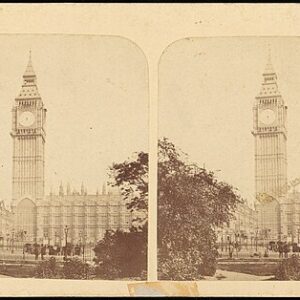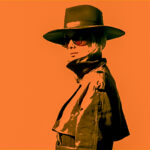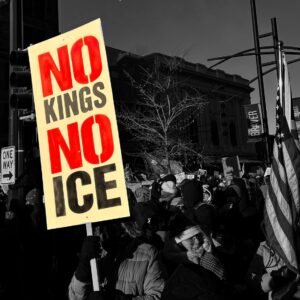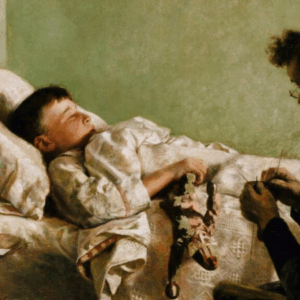
Remembering the Worst Book Signing Ever
Lori Jakiela on the Time Sam's Club Confused Her For Miss America
Outside Sam’s Club there’s a bubble machine, like on Lawrence Welk. It’s meant to be festive because this is a grand opening, a new store on the outskirts of Pittsburgh, but customers swat the bubbles like flies. A creepy clown with a button that says “Free Hugs” chokes balloons into poodles while a woman with a Marge Simpson up-do hands out free-hotdog coupons like she’s doling dollars from her own wallet. A teenager with boxers that poof from his jeans like a life preserver shows people where to get the free cake.
“Keep a song in your heart,” Lawrence Welk, that polka pimp, that purveyor of wonderful, said so often it’s on his tombstone.
I’m trying.
* * * *
When my publisher’s in-house publicist Annie called to say she’d set up a booksigning for me at Sam’s Club, she said, “Don’t snark. It’s a good opportunity.” She said, “It’s not just any Sam’s. It’s a Grand Opening.” She said, “Sam’s moves a lot of books.” She said, “Sedaris does Costco all the time.”
I know I should be grateful. Years later, I’ll realize how grateful. But for now, this is my first book and with each day its failure, my failure, becomes more obvious and heart-sinking.
For every writer, the first-book dream is different. For me, it was a review in The New York Times, maybe O Magazine. It was NPR with Terry Gross, who’d teach me to sound sexy-serious and let me touch her hairdo because we’d be instant friends like that.
What’s happened, though, is pretty much nothing. I check my pulse-less Amazon sales rankings every 15 minutes, even in bed under the covers. I Google myself. I Google myself again. I Google myself again and my husband swats me because he wants to sleep.
“Just write another book,” he says, but there’s this one to hope for and mourn first.
* * * *
Annie the publicist is perky as an Alka Seltzer, but I know and she knows my book isn’t selling enough to make back my advance, which is death for my writing career. Lately I’ve been doing what I can. I’ve been giving readings at dive bars and senior citizen centers, in basement book clubs and at 4H fairs.
Last week I gave a reading at a club where people were armed with Nerf guns and threatened to shoot if they didn’t like what they heard. I was prouder than I should have been when they didn’t shoot.
Sam’s Club, by most accounts, is a step up from a Nerf assault, but it’s depressing like all things Walmart. A few years back, some kids from my high school alma-mater started the website “People of Walmart.” It’s supposed to be funny, but it usually makes me sad, even when the pictures are of a guy banana-shopping in a red Speedo or someone’s pet goat munching flammable lingerie. It’s depressing to think of everything in bulk, all those fluorescent lights and security cameras, smiley cartoon faces rolling fair-wages all the way back to China.
It’s depressing to think how often I end up shopping there.
“Of course I’m in!” I told Annie about the signing, and made my voice match hers bubble-for-bubble.
I hate myself.
* * * *
Today I got dressed in my writer outfit, all black—black dress, black tights, black kitten heels, black scarf. It’s a fancy get-up, as fancy as I get, but the dress is worn and pilling at the sleeves and armpits. It used to fit perfectly but now it pulls across hips that never got back to their pre-baby size. No matter what I do I look tired. I am tired.
My daughter Phelan is almost two. She wakes off and on all night. My son Locklin is five and wakes early. I’m not sure how much sleep I get but it’s not a lot. My husband Dave trims my hair with his electric razor because these days I don’t have time or money for a real haircut. If I tilt my head, my hair looks almost even. I convince myself the ragged ends make me look edgy. I pass my dark roots off as punk.
“Thanks for doing this for the family,” Dave says, about everything, and I say it back to him.
Even in the mornings, my breath smelling like dead dog, dark circles under my eyes like a boxer’s, he calls me beautiful. I love him, and I believe he loves me, but he’s a writer, too, and between love and children and jobs and writing and bills and laundry and trash day, the world is exhausting us both.
Today I put on more makeup than usual. I squeezed into two pairs of Spanx until my stomach looked almost flat. I checked my dress for spots—milk, spit, toothpaste, a soggy Cheerios smear. I filled in a bleach stain with black Sharpie.
When I left, Dave was on the floor playing Star Wars with Locklin.
“Be him,” Locklin said, and passed Dave a toy Yoda.
Dave ran Yoda up the hem of my dress. “Fuck you I would,” he said.
“He can hear you,” I said, and cocked my chin toward Locklin, who was oblivious, deep in a light-saber battle with Luke Skywalker.
My husband swears so much and so often no one notices he swears.
I bent down and kissed them both on the tops of their heads.
“Good luck,” Dave said, and I said, “Seriously. It’s Sam’s Club.”
“Get some toilet paper,” Dave said. “We’re low.”
* * * *
At the Sam’s Club entrance, I ask the teenager in charge of cake for help. “I’m here for a reading and booksigning?” I say.
“Do you know where I should go?”
“A book on signing?” he says. “Like sign language?”
He throws up a peace sign, then says, “There’s free cake inside to the right,” and juts his chin to show the way.
I don’t know much sign language, but my favorite sign goes like this:
Put your left forearm flat in front.
Take the first two fingers on your right hand and make a peace sign.
Turn your hand upside down.
Pretend the fingers are legs.
Stand the legs on your left forearm.
Consider the forearm a bridge.
Send the little person you’ve made diving off the forearm, legs kicking.
Make a silent screaming “O” with your mouth.
It’s how I feel.
* * * *
Inside Sam’s Club, everything—the signs, the cake, the carts, more Grand Opening balloons—is red white and blue, as if Sam’s is America itself and not just a place where Americans get a bargain on 1,000-count boxes of latex exam gloves.
People ram by, massive carts stuffed with paper towels and dog-food bags big enough to stash bodies in. Behind me a woman in a motorized scooter with a red balloon tied to the back revs up. She says, “Beep,” extending the vowels into a screech. She waves her arms like propellers. “I’m trying to get through here,” she says. “Jesus Christ.”
I make my way to the information desk. I’ve brought a copy of my book and hold it up to show the woman at the desk. She’s wearing a regulation Sam’s vest. It’s covered with American flag pins, smiley faces, and buttons that say, “Ask Me! I Can Help!”
I say, “I’m here for a booksigning? Do you know where I’m supposed to go?”
“A what?” she says.
“I’m an author,” I say and point to my book. “I’m supposed to sign some books here?”
“I don’t know nothing about that,” the woman says and holds up a finger, then reaches for a big red phone that looks like a cartoon.
Off toward the snack bar, the giant free cake seems mauled by squirrels. The line for free hot dogs stretches back to the entrance. The 300-count bags of roasted pig-ear dog treats are buy-one-get-one, which explains why nearly every cart that rolls by is stocked with them.
* * * *
My book, by the way, is called Miss New York Has Everything, a line I took from an episode of the 1970s TV show That Girl. In the episode, Marlo Thomas, an independent woman making her way in the big city, enters the Miss New York pageant. As part of the competition, she makes a cheesecake with all New York ingredients. Things go, expectedly, wrong.
I thought the title would be ironic, maybe, but most readers thought it was Chick Lit. When I’m around other writers, to say the title of my book makes me wince.
“Don’t worry,” my agent said. “Men aren’t your audience anyway.”
The cover of my book features bubble print and a picture of a smiling flight attendant. The top of the flight attendant’s head is cut off. The cover and the title don’t reveal much about what’s inside—mostly a story about growing up in a mill town, Trafford, PA, then moving to New York to be a writer and becoming a flight attendant instead, then moving back home.
If I saw my own book on a shelf, I wouldn’t buy it. I’d think it was about shopping for Louboutins. I’d think it was Sex in the City.
“I want not only to be loved but also told I am loved,” the Victorian novelist George Eliot said.
George Eliot’s real name was Mary Anne Evans. She took a man’s name because she didn’t want to be dismissed as a woman writer, which meant either a romance novelist or a hysteric.
George Eliot was smart, but not beautiful. Her family made sure she was educated as backup. Not a good candidate for marriage, she became a writer instead.
* * * *
The information desk woman seems to be on hold. I’m trying to do math—how many roasted-pig-ear dog treats can an average American household get through in a year—when I see the sign. It’s behind a wall of stacked toilet paper. The sign is huge, like something from a used-car lot, yellow bulbs forming a giant flashing arrow. The arrow points to a spot behind the toilet-paper wall.
On the sign, a message in bold black letters reads: COME MEET LORI JAKIELA. All caps. There’s more, but the toilet-paper wall blocks it out.
“That’s me,” I say to the woman on the red phone. I point to the sign. “It’s ok. I’m her.”
The woman looks doubtful. Then she says, “Whatever you say,” and keeps the phone to her ear.
I turn and walk toward the sign. My name is there, in lights, even if they are used-car lights, even if these lights flash behind mounds of very reasonably priced toilet paper, even if the lights are smack in the center of a giant conglomerate where the air smells like old hot-dog water. I feel pretty good.
“I want not only to be loved but also told I am loved,” George Eliot said and she didn’t mean herself just as a woman, I think. She meant as a writer. She meant her books.
I look around again at all the Sam’s Club shoppers, all those readers and book lovers, and realize I have been a ridiculous neurotic ungrateful malcontent. I promise to call Annie, the publicist, first thing and apologize for being the jerk I am.
“My life is going to change,” a character from one of my favorite Raymond Carver stories says. “I feel it.”
He means, of course, it isn’t, but I’m not considering that.
* * * *
As I get closer to the sign, I notice a long line of mostly middle-aged men, waiting. My agent said men weren’t my audience, but here is evidence. I feel myself filling up with myself, like a Grand Opening balloon, all pride and hot air.
I walk past, smiling, waving.
I say, “Hey there.” I say, “Nice to see you.” I say, “Thanks for coming.”
Nearly all of the men wear Dockers and polo shirts, various blues and beiges. Some of them have cell phones latched to their belts. There’s a lot of cologne. Like the woman at the information desk, the men seem confused. Some check their watches, waiting for the real show to start.
When I get to the front, I see why. There’s the full sign, which close-up is so bright it’s blinding. The rest of its message, the part that had been hidden by toilet paper, reads:
COME MEET LORI JAKIELA
MISS AMERICA
I stop in front of the sign. I step back. I look at it. I squint. I look again. I will it to say something else. I think maybe there are two of us here, me and Miss America. I think it’s a grammatical error, a missing “and,” a lost comma.
Then I think, no.
Annie talks so fast, she’s so perky, it would be an easy mix-up. Miss New York. Miss America. I stand in front of the sign for what feels like a long time. I look down at my dress, the blacked-in bleach spot, my un-shined, un-beautiful shoes. Six months ago, I would at least have had my post-preggo boobs, but now, nothing.
Off to my right, there’s a long table. Annie was right about one thing. Sam’s has ordered a lot of books. Stacks of them are piled up, ready for Miss America to sign, bubble hearts dotting all her i’s.
A chair rests at the table. A small placard in front of it repeats my name, my alleged title, in case the flashing car-lot sign isn’t enough.
I walk over. I sit down.
* * * *
The questions start at once. The first guy in line, who may have been here an hour or more, bends down to look under the table, like I might be hiding someone else underneath there. His hair is gelled. It doesn’t move when he bobs down and up, twice. He reaches in his back pocket and pulls out a picture of himself with, I think, the most recent Miss America.
He says, “You are not her.”
He says, “I know her.”
He says, “This is false advertising.”
His face is red. Above his upturned polo collar, a vein pops in his neck like a worm. He stomps a foot. “I’m getting the manager over here now,” he says.
He starts to walk away, then turns back. He leans over and puts both hands on the table in front of me, like he’s a lawyer on TV. He’s wearing a school ring. It’s tight and his finger poufs out around it like a sausage. I stare at his finger because I don’t want to look at his face. I wish both of us invisible, gone.
He says, “And when exactly were you Miss New York?”
It goes on like this. Some of the men wander out of line. Others want to vent. One asks me to stand up so he can see my legs. At first I don’t know why, then I realize he wants to compare them to the flight attendant’s legs on the cover of my book.
“Those aren’t even your legs,” he says, loud and over his shoulder so the others can hear.
He’s right. Those are not my legs. My legs, underneath the black tights I’m wearing, are mottled and bruised. When we took the kids on vacation to a kiddie water park, my husband noticed all the other parents there looked a lot like us—everyone bruised and swollen, lumpy and exhausted. It was easy to sort the parents from the non-parents, like we’re two different tribes.
“The world is beating the shit out of us,” my husband said. “All the parents look like crack whores.”
To the man in front of me, I say, “It’s a stock photo,” and laugh a little. I say, “She’s probably not even real.”
The man glares at me, like I’ve tried to sell him swampland, like I’ve denied him his slice of free cake.
I say, gentler. “I’m not on the book, but I wrote it.”
I think this should count for something.
I hope it will count for something.
* * * *
“You must love your work and not be always looking over the edge of it,” George Eliot said. “You must not be ashamed of your work and think it would be more honorable to you to be doing something else.”
George Eliot, whose great intellect trumped beauty, went on to have steamy love affairs and eventually married a man 20 years younger than her. In portraits, she had lovely blue eyes.
I won’t think of George Eliot until later, of course. For now, at this table, it’s just this man and me. He picks up a copy of my book, the book that took me a lifetime to write, the book I thought would change everything. He turns it over like he’s checking nutritional value on a cereal box. Then he tosses it down.
“All lies, I bet,” he says.
“Miss New York,” he says. “Some joke.”
* * * *
When the manager comes over, he’s sweating. He’s been fielding complaints. He says, “Well, it’s nice to meet you I guess.” As he’s talking, he turns the placard in front of me face down. The manager also wears Dockers and a polo shirt, the uniform of his tribe. His hair is smoothed into the beginning of a comb-over. He looks at the flashing sign. He says, “There’s not much we can do about that, other than unplug it,” which he does. He doesn’t apologize. He offers me a free hotdog, some cake. He says, “You’re supposed to be here two hours, but I understand if you don’t stay that long.”
“Oh that’s ok,” I say, and try to come off as congenial, Miss Congeniality, a consolation prize.
“Sam’s moves a lot of books,” Annie had said.
I stay the whole time. I’m not sure why, other than there are all these books and I feel like I should stay with them, the way a captain is supposed to stay with a sinking ship. I take out my notebook and start writing. I take a lot of notes. This makes me feel better, like the words are righting things.
* * * *
A woman who may or may not be the same one who beeped at me earlier whizzes up in her electric cart, the red balloon still bobbing behind her like a buoy.
“What is that, a catalogue?” she says. “What are you people selling now?” Then she revs off, rams a toilet paper tower, and sends a massive pack flying.
Another woman in a matching leopard-print stretch top and pants stops by to say she was a Pennsylvania Junior Miss back in the 1970s.
“I was for real,” she says.
No one buys a book. I don’t sign a single copy. In the moments between visits from people who want to talk or shout at me, I look at the image of the woman on my book cover, her full red lips, wide smile, perfect legs. Under the table, I curl my legs back and think of the witch’s legs disappearing beneath her house in The Wizard of Oz.
“Fuck you I would,” my beautiful husband said to me on my way out the door.
Still. I touch my hair. I wish I’d brought lipstick. I wish myself beautiful or invisible, both.
* * * *
When my two hours are up, I grab my copy of my book. It’s ragged, dog-eared, marked up from the readings I’ve been doing. There’s a chocolate-milk sippy-cup stain on the back.
The manager comes over to say goodbye. “I think we moved some inventory, so it wasn’t all for nothing,” he said.
He said, “Did you get a hot dog?”
* * * *
At the Sam’s Club exit, a security guard stops me.
“I’m going to need to see a receipt,” the woman says.
“I didn’t buy anything,” I say. “I’m an author. I was here for a booksigning.”
The woman points to my book. She says, “I need to see your receipt for that,” she says.
I point back over my shoulder to the sign. I point to my name on the cover. My name is in bubble print next to the flight attendant’s perfect left calf. I say, “That’s me. I’m a writer. This is my book.”
“I’m going to need to see some ID,” the woman says and doesn’t smile.
* * * *
George Eliot said, “It’s never too late to be what you might have been.”
George Eliot said it first, but people have forgotten that. Now her words are everywhere, on refrigerator magnets and t-shirts.
You can buy them in bulk.
You can get a good deal.
Lori Jakiela
Lori Jakiela is the author of three memoirs, most recently Belief Is Its Own Kind of Truth, Maybe (Atticus Books), which was a finalist for the 2016 CLMP Firecracker Awards and is shortlisted for Stanford University's 2016 Saroyan Prize for International Writing. She lives in Pittsburgh with her husband, the author Dave Newman, and their children.



















